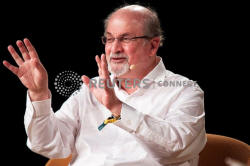Words of Wisdom: Life Lessons with Salman Rushdie
 Send a link to a friend
Send a link to a friend
 [September 10, 2019] By
Chris Taylor [September 10, 2019] By
Chris Taylor
NEW YORK (Reuters) - Magic realism is a
literary genre in which narrative is shot through with surreal,
dreamlike, seemingly impossible moments.
If famed author Salman Rushdie is a dean of the genre, perhaps it is not
surprising that his life exhibits so many similar traits.
To wit, the struggling young writer penned the classic “Midnight’s
Children,” which would go on not only to win the prestigious Booker
Prize, but the “Booker of Bookers,” which pit previous champions against
each other.
Then came the fatwa against him in the aftermath of “The Satanic
Verses,” a death sentence from some Islamic authorities, which threw him
into daily danger and consumed years of his life.
The longtime U.S. resident is now enjoying a new high, with his new book
“Quichotte” short-listed for another Booker Prize. As part of Reuters
Life Lessons series, we sat down with the 72-year-old author to discuss
his life on and off the page.
Below are edited excerpts from the interview.
Q: As a young writer starting out, what was the money situation like?
A: I was broke most of the time. In those days in the UK, you could get
a part-time job at an ad agency and work two or three days a week.
"Midnight’s Children" took five years to write, and I paid the bills by
working at Ogilvy & Mather.

Q: What was it like to go from scraping by, to being a smash?
A: It was completely unexpected. I wasn’t even sure who would publish
it. When it did come out, even then I didn’t expect it to become a
global bestseller. That changed my life, and I was so grateful. It gave
me the ability to sit at home and work, which for a writer is almost a
miracle.
Q: Did you make any money mistakes, once you became a success?
A: I’ve always been quite sensible about money. I didn’t buy any fast
cars, for instance – I bought an ordinary Citroen. Even if I had the
money, I never wanted a Lamborghini. I don’t have extravagant tastes,
and I never have had.
Q: With the fatwa, what did you learn about enduring in an impossible
situation?
[to top of second column] |

The writer Salman Rushdie interviewed during Heartland Festival in
Kvaerndrup, Denmark June 2, 2018. Carsten Bundgaard/Ritzau Scanpix/via
REUTERS

A: Until you’re placed in a position like that, of extreme pressure, you don’t
really know how you are going to react. It’s impossible to know in advance. What
I learned about myself is that I was able to endure, and fight back, and come
out on the other end, and not be crazy. That was a surprise to me. Everyone has
a resilience that you might not suspect yourself of having.
Q: Some of your philanthropic money has been devoted to school lunches in South
Africa – why is that?
A: A friend of mine started a charity called The Lunchbox Fund, which gives a
healthy midday meal to schoolkids in the poorest areas of South Africa. Truancy
rates in the townships had been very high. If you tell students they are going
to have a big lunch, then they stay in class and get an education. It’s an
impressively simple idea.
Q: What life lessons do you try to pass on to your own children?
A: Kindness and hard work. Fortunately for me, both of my sons are very kind and
are working hard at things they love. Neither of them followed in my footsteps,
though. They are carving out lives for themselves that are anything but
literary.
My oldest son has a public relations and event management firm, and my younger
son is completing a diploma in music production and sound engineering. That’s
where they are passionate.
Q: Since we are in unique times, both in the U.S. and the UK, any lessons to be
learned from these strange political moments?
A: With Brexit, I’ve always been strongly against it. I would love to feel that
this juggernaut heading off the edge of a cliff can still be stopped. Maybe it
can’t be, but I live in hope.
As for Trump, I feel the way for the country to regain its real self is to
defeat him. I dread to think what would happen if he were re-elected. Next
November will be a real turning point in the U.S. People will have to decide
what kind of country they want to live in.
(Editing by Lauren Young and Dan Grebler; Follow us @ReutersMoney or at http://www.reuters.com/finance/personal-finance.)
[© 2019 Thomson Reuters. All rights
reserved.] Copyright 2019 Reuters. All rights reserved. This material may not be published,
broadcast, rewritten or redistributed.
Thompson Reuters is solely responsible for this content.
 |